Students in the Senior Design Challenge have worked toward positive social impact on topics ranging from education to healthcare to sustainability, and beyond.
Highlights of what our students have worked on include:
2023
This year, four multi-disciplinary student teams worked on projects with COVER Home Repair, the Hanover Economic Development Council, New Hampshire Healthcare Workers for Climate Action, and the Windsor Central Supervisory Union school district. Here is the video of their final presentations:

Projects:
- 7:08 - COVER Home Repair: building community among low-income homeowners and repair volunteers
- 20:04 - Hanover Economic Development Council: paving the way toward a vibrant future for downtown Hanover
- 35:15 - New Hampshire Healthcare Workers for Climate Action: helping kids and their parents learn about the health effects of climate change
- 48:09 - Windsor Central Supervisory Union: enabling high school students to appreciate diverse global perspectives
2022
In this year's class, five multi-disciplinary student teams worked on projects in the domains of healthcare, media, social justice, and the environment. Here is the video of their final presentations:
Projects:
- 4:59 - Community Access Television: Uplifting voices of marginalized communities through local public media
- 17:25 - Special Needs Support Center: Enabling individuals with special needs to more safely interact with police
- 30:00 - Dismas House of Hartford: Helping formerly incarcerated individuals reintegrate into society
- 43:39 - Dartmouth-Hitchcock Medical Center: Improving the recovery process for patients with traumatic brain injuries
- 55:25 - Sustainable Woodstock: Expanding access to weatherization services for low-income Vermonters
2021
For our first ever fully-remote Senior Design Challenge, students worked on challenges in social justice, entrepreneurship, and healthcare.
You can watch the entire 2021 final presentations video here.
Addressing clinician burnout
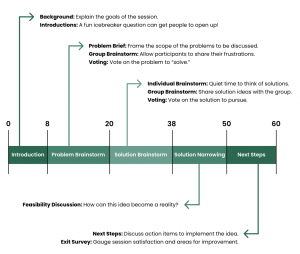
Partnering with the Levy Healthcare Delivery Incubator at the Dartmouth-Hitchcock Medical center, a team of students created a way for clinicians and the hospital administration to collaboratively create solutions to improve workflow operations and provider well-being. See the final presentation here.
Fostering anti-racism in schools
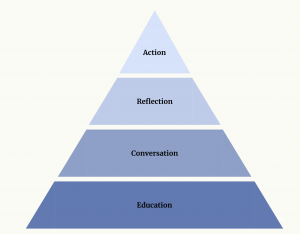
Partnering with Woodstock Union High School, a team of students created a game-based curriculum to help high schoolers learn about—and take action on—issues of social justice in their school. See the final presentation here.
Helping patients recover from disease at home

Partnering with the Levy Healthcare Delivery Incubator at the Dartmouth-Hitchcock Medical center, a team of students created a way for patients participating in the Stress Management and Resiliency Training (SMART) program better adhere to the beneficial activities of the program remotely. See the final presentation here.
Connecting small businesses to government
Partnering with the nonprofit organization Forward Cities, a team of students created a way for entrepreneurial support organizations (ESOs) voice their concerns to elected government officials, in order to help create policy conducive to helping small businesses thrive. See the final presentation here.

2020
Showing resilience during COVID-19 pandemic and the shift to remote learning, student teams persevered to complete projects in the domains of education, healthcare, and sustainability.
You can watch the entire 2020 final presentations video here.
Patient-doctor communication
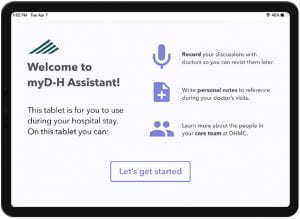
Partnering with the Serious Illness Healthcare Delivery Incubator at the Dartmouth-Hitchcock Medical center, a team of students created a way for patients to better understand the sometimes confusing and overwhelming information presented to them by their doctors. View the digital project board here. See the final presentation here.
Connecting schools with their community
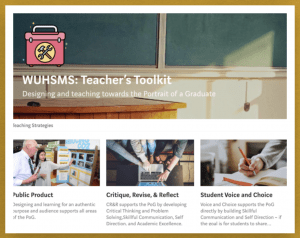
Partnering with a local school district, the Windsor Central Supervisory Union, a team of students created an online way for teachers and students to showcase the academic work being produced in the classroom, in order to build visibility and foster partnerships with community organizations. View the digital project board here. See the final presentation here.
Climate change resilience
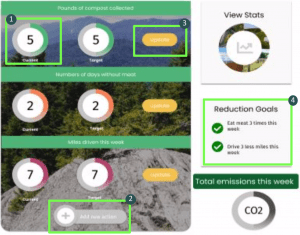
Partnering with the Upper Valley Adaptation Workgroup, a team of students created a way for concerned citizens to receive personalized recommendations for specific actions they can take to combat climate change. View the digital project board here. See the final presentation here.
Individuals with chronic illnesses
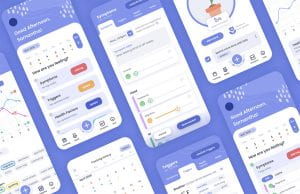
Partnering with the nonprofit organization Suffering the Silence, a team of students created an app that allows individuals with chronic illnesses better track and understand their symptoms and triggers, and share the data with their doctors. View the digital project board here. See the final presentation here.
2019
The theme of the 2019 Senior Design Challenge was healthcare. In this video of final presentations, four student teams share their process and proposed innovations:
Projects (links go to short project videos):
- 6:02 - Pison Technology - Students designed a user-friendly setup experience for an assistive device for patients with ALS (amyotrophic lateral sclerosis).
- 8:20 - Weight & Wellness Center (Dartmouth-Hitchcock) - Students designed an obesity management program that blended in-person and remote (telemedicine) healthcare delivery.
- 29:25 - Women's Health Resource Center (Dartmouth-Hitchcock) - Students designed a curriculum and series of events to help new parents practice self-care while caring for their baby.
- 42:33 - Patient Safety Learning Lab (Dartmouth-Hitchcock) - Students designed a communication protocol to assist healthcare providers in early detection of patient state deterioration.
2018
Energy & sustainability
Partnering with Efficiency Vermont, a team of students set out to help small- and medium-sized businesses in Vermont save energy. The students created a framework for an internship program in which undergraduates interning for Efficiency Vermont will become "Efficiency Ambassadors" to educate Vermont small business about Efficiency Vermont's offerings, and help the businesses engage in small-scale efficiency projects.
Healthcare
Partnering with The Dartmouth Institute for Health Policy and Clinical Practice, a team of students created a mobile app to help teenagers with asthma better manage their health condition and become more empowered advocates for themselves in their care. The students created a functional prototype of the app, tested it with users, and delivered this code to our partner.
Food insecurity
Partnering with the Upper Valley Haven, a team of students was were tasked with using the human-centered design methodology to identify opportunities for the Haven to better address issues of food insecurity in the Upper Valley region. The students' final product provides the Haven with tools to connect with their users and enables users to play an active role in improving the resource to meet their ongoing needs.
Consumer goods
Partnering with Burton Snowboards, a team of students leveraged the design thinking process to reimagine the snowboard e-commerce purchasing experience. They employed a variety of primary and secondary research methods—ranging from surveys and interviews to website demos and competitive analysis—in order to better understand and empathize with the user experience of buying a snowboard on Burton’s website. In the students' final presentation, they shared the research and insights underpinning their project, as well as describe three distinct Burton.com challenges and the ideas they developed to overcome them.
Aging
Partnering with the Peter Sheehan Diabetes Care Foundation, a team of students developed a schematic and community plan for a population of elderly Chinese-American individuals living in NYC's Manhattan Chinatown. Charged with conceptualizing a living community in which elderly residents can be assisted by technology in managing diabetes care, the team conducted several research trips to New York, and created a comprehensive solution involving architectural renderings, community garden programs, and a detailed report of findings and recommendations for our partner.
2018 partner organizations:
